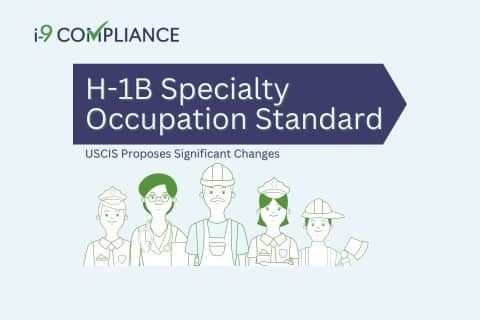USCIS Proposes Significant Changes To H-1B Specialty Occupation Standard

December 12, 2023
The U.S. Citizenship and Immigration Services (USCIS) recently published a Federal Register notice, which introduced a proposed rule relating to the H-1B program. It seeks to modify and explain what requirements constitute a “specialty occupation.” This clarification is crucial because it determines whether a position qualifies for the H-1B program.
The USCIS’s current standards require the following to qualify as a specialty occupation:
- Theoretical and practical application of a body of highly specialized knowledge; and
- Attainment of a bachelor’s or higher degree in the specific specialty (or its equivalent) as a minimum for entry into the occupation in the United States.
The proposed rule is Modernizing H-1B Requirements, Providing Flexibility in the F-1 Program, and Program Improvements Affecting Other Nonimmigrant Workers. The proposal would amend the definition and add additional language to codify existing agency practices. According to USCIS, it intends to add the following language:
- “There must be a direct relationship between the required degree field(s) and the duties of the position;
- there may be more than one acceptable degree field for a specialty occupation, and
- a general degree is insufficient.”
These regulations have attempted to clarify the requirements for what constitutes a “specialty occupation.” However, these attempts have only confused concerned parties on what qualifies. For example, some have questioned whether the rule would code the clarifications based on current practices. Some commented that such a decision would lead to little change. Whatever the codification, many experts disagree on the regulation’s potential impacts.
The proposed rule acknowledges how multiple degrees could qualify individuals for a position. However, every degree must directly relate to the role. Experts have argued whether this change would prove more or less restrictive than current practice. However, they all agree that it depends on how the USCIS presents the decision.
One significant limitation clarified what degrees would not qualify for an H-1B position. For example, it would prevent general degrees, such as business or liberal arts degrees, from qualifying. However, the USCIS did not expand on how restrictive this limitation would become for H-1B positions. Many have questioned how specific the degree must be for approval by the H-1B program.
Another clarification of the regulations will clarify the usage of the word “normally.” According to the clarification, “normally” would mean most of the time, not always. This clarification could expand specialty occupations to positions that do not require a bachelor’s degree. However, specialty occupations still need a body of highly specialized knowledge. Petitioners must also demonstrate a direct relationship between the degree and the position’s job duties.
Employers hiring H-1B workers must remember to complete the employment eligibility verification (Form I-9) for all new hires. Unfortunately, this can prove complicated for temporary workers due to the many documents they may present as proof. One way to correctly and consistently complete I-9 forms is by using an electronic I-9 management tool. This tool guides employers through the entire process. It can also store the documents and provide alerts of when to take action.
Learn more about automating your employment eligibility verification and ensuring compliance with I-9Compliance.